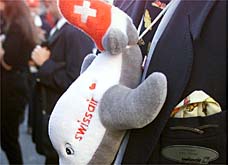Swissair debacle still leaves a bitter taste

The grounding of Swissair in October 2001 was more than a humiliating business debacle – it badly wounded Swiss national pride and undermined the standing of business leaders.
Switzerland’s coveted reputation for reliability and high standards took a nosedive alongside the venerable 70-year-old airline.
Above all, the grounding of Swissair – amid outrage from stranded passengers, political recriminations and the launch of several investigations – marked the beginning of the end for one of Switzerland’s most globally recognised standard-bearers.
For the Swiss themselves, both at home and abroad, the airline’s collapse was bitter blow. The spectacle of a red-and-white Swissair tail fin was often more than just an aircraft. It had an emotional significance similar to a nation’s flag or national anthem.
Although one year later, the airline’s remnants have been given a fresh lease of life in the new national airline, Swiss, the damage has been done.
Black Tuesday
On October 2, the airline’s owners, the Swissair Group, grounded all flights around the world after fuel suppliers refused deliveries in retaliation for unpaid bills.
The Swiss president, Moritz Leuenberger, described the event as a disaster, before lashing out at Switzerland’s two biggest banks, UBS and Credit Suisse, for deserting the carrier and cutting off its lines of credit.
In turn, the Swiss public and the country’s populist press expressed their anger by taking aim at the government’s failure to bail the airline out.
Swissair’s fatal ambition
But despite the indignation, more measured subsequent post-mortems of the grounding revealed that the airline had fallen victim to its own over-ambitious expansion strategy.
Eager to position itself as one of the Europe’s leading carriers, the then SAirGroup spent much of the 1990s aggressively buying into regional airlines – including a disastrous 49 per cent stake in the ailing Belgian carrier Sabena – a strike-plagued company that had never turned a profit.
By 2001, that high-risk strategy, combined with a global economy already beginning to cool and a bitterly competitive aviation industry, saw revenues collapse. The year opened with major leadership upheavals, much of it within the SAirGroup’s board.
In March of that year, nine out ten board members resigned, ahead of a disastrous declaration on April 2 of an SFr2.9 billion annual loss for 2000.
By the month’s end, the company had renamed itself the Swissair Group, having securing a SFr1 billion loan from Swiss banks. As it turned out, the move only delayed disaster.
Cash burn
On August 30, the group reported more red ink – first-half losses of SFr234 million. Job cuts and asset sales were announced.
By September 11 – when the terrorist attacks in the United States all but stalled the global aviation industry – Swissair’s survival was on tenterhooks.
Ten days later, the airline calculated losses caused by flight cancellations in the wake of September 11 at SFr65 million.
The final blow came on October 2, when UBS declared a company-bridging loan off limits for daily operations. Swissair’s never-ending “cash burn” was finally extinguished.
The result was the immediate dismissal of almost 3,000 Swissair staff worldwide – 1,750 of them in Switzerland. Thousands more followed in coming months.
Humiliating spectacle
At Zurich’s international airport, visitors to the country were greeted by the sight of row upon row of grounded Swissair jets.
The psychological impact of the grounding on the national economy is arguably still being felt.
Many market analysts agree that the demise of Swissair saw Swiss investors take an increasingly critical look at the country’s business elite – sometimes accused of being a cosy and unaccountable “old-boys'” network.
Previously lionised business figures faced close scrutiny for their roles in the collapse. Big names to face criticism included the airline’s CEO, Mario Corti, along with his then fellow Swissair Group board member and the now departing Credit Suisse boss, Lukas Mühlemann.
Negative press – just the beginning
The critical sentiment has spread well beyond aviation.
The year after Swissair’s grounding saw further cracks appear in the country’s normally sturdy business reputation. Blue chip firms such as ABB, Zurich Financial and Credit Suisse have all fallen from grace amid shareholder discontent with company leadership.
In the end, the final demise of Swissair was prolonged for several months, thanks to government credit.
Swissair’s last flight touched down at Zurich airport on April 1 of this year, marking the end of an era.
swissinfo, Jacob Greber
Swissair planes were grounded on October 2, 2001 after 71 years in business.
On October 3, 2001 the Swiss government granted a bridging loan of SFr450 million.
Some 3,827 jobs were cut following the collapse of the national airline.
The first official flight by the new national airline “swiss” landed in Zurich on March 31, 2002.
The last Swissair plane touched down in Zurich from Buenos Aires on April 1, 2002.

In compliance with the JTI standards
More: SWI swissinfo.ch certified by the Journalism Trust Initiative










You can find an overview of ongoing debates with our journalists here . Please join us!
If you want to start a conversation about a topic raised in this article or want to report factual errors, email us at english@swissinfo.ch.